More actions
m tense |
SOWF summary |
||
| Line 110: | Line 110: | ||
The DOC evaluated these factors and came to the conclusion they stand by to this day - The Exchange and Voyager must be seized. | The DOC evaluated these factors and came to the conclusion they stand by to this day - The Exchange and Voyager must be seized. | ||
== Immediate Aftermath == | |||
With tens of millions of dollars in these institutions, their seizures applied significant deflationary pressure on the economy, as hundreds of players could not access the bulk of their money. Property was particularly affected as these are primarily sold at auction by the [[Department of Construction and Transport|DCT]]. | |||
The DOC experienced backlash for its handling of the situation, particularly in the returning insured & recovered balances which has sat frozen for over two months - stifling players enjoyment and capacity to conduct business. | |||
== State-Owned Withdrawal Facility == | |||
=== Summary === | |||
The government wishes to return more than the $50,000 insurance per person, but the government treasury is too small to facilitate this all at once. The [https://www.democracycraft.net/threads/true-economic-redemption-act.27320/ True Economic Redemption Act] is currently in the House of Representatives and proposes a State-Owned Withdrawal Facility ("SOWF") which will be jointly run by the DOC and FRB. The facility's goal is to "facilitate the withdrawal and payment of deposits owned by banks that are unable to pay them back." | |||
=== Structure === | |||
Deposits from Vanguard, Discover, Voyager, and The Exchange may be transferred by the DOC to the SOWF, alongside any assets that can be liquidated from the failed banks. The FRB has the power to mint funds if required, and the DOC will disburse funds to depositors as appropriate. Deposits not covered by insurance, liquidation, minting or additional congressional funding will be considered unrecoverable and cannot be pursued by depositors. | |||
=== SOWF Notes === | |||
The SOWF has the power to create "SOWF Notes" to trade funds stored in the facility prior to withdrawal. A SOWF Note, upon its specified maturity, will be redeemable for in-game cash. SOWF Notes are not considered legal tender, but they are be backed by the Commonwealth government and accepted as payment by government institutions. Private companies are not required to accept SOWF Notes as payment, but are encouraged to do so. | |||
[[Category:Financial industry]] | [[Category:Financial industry]] | ||
[[Category:Banks in Redmont]] | [[Category:Banks in Redmont]] | ||
[[Category:2025]] | [[Category:2025]] | ||
Revision as of 07:50, 27 July 2025
Summary
During May and June of 2025, the DOC comandeered Vanguard National Bank, Discover Bank, Voyager Bank, and The Exchange following a liquidity crisis. The banking sector prior to the seizures was characterised by poor cash management, speculative investing, heavy interdependence of the banking industry, and security fraud.
Vanguard
On the 16th of May 2025, the DOC under Secretary xSyncx, seized Vanguard and Discover Bank - the two major banks under the leadership of Nexalin. The investigation into the banks began in March. Below is a replication of the DOC report, with fewer images and records. The full report can be found here.
Initial Tax Exemption Removal
Response
On 22/03/25, after Nexalin (“Nex”) failed to submit Vanguard & Discover's required financial reports to the DOC, the banks' tax exemptions were removed. Nex initially tried to claim to his clients that he had submitted these reports, however the report in question was blank and had no fields filled out.
After further prompting, he submitted all he was required and was returned his tax exemption on a few conditions:
- An audit of the banks by the DOC,
- Separation of Financial of Vanguard Group companies and proof that this has been done,
- Creation of separate LLC and / or corporations for each Vanguard Group Company as required including but not limited to Vanguard and Discover Banks,
- Any other proof needed to show that [the banks] are legally compliant with all regulations of a commercial bank registered in Redmont by law.
Nex acknowledged that non-cooperation will have the tax exemption removed and the bank potentially commandeered.
The Audit
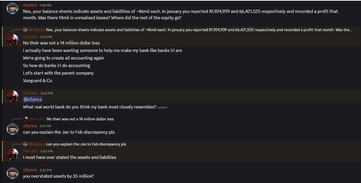
The DOC audit was conducted by Secretary xSyncx, Deputy Secretary Avaneesh2008, and Compliance Manager TrueDarklander.
Equity Loss
Upon reviewing Nex’s financials, a loss of $14 Million in equity was clear. This was brought up by the DOC on the 28th of March but Nex tried to blame an administrative error before later backtracking saying "I must have over stated the assets and liabilities".
Nex then tried to explain away the loss in equity as a change in deposits (presumably withdrawals). This is not how equity works, and indicates either a poorly made-up excuse or a fundamental misunderstanding of recordkeeping.
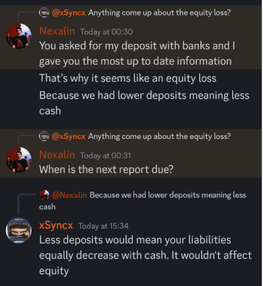
As an example, saying “we had lower deposits, so less cash, so less equity” is wrong because deposits are liabilities, not equity.
Explanation: If someone deposits money to a bank, the bank now has more cash, yes—but they also owe that money back to the person, so their client obligations (deposits) equally increase. Conversely, if someone withdraws money, the bank has less cash as they pay out the client, and since it no longer owes this amount, their client obligations equally decrease. Equity is the excess value of what you own (assets) after subtracting all you owe (liabilities). Hence people depositing/withdrawing in exchange for cash has no immediate effect on equity. Blaming equity loss on “lower deposits” shows a misunderstanding of basic accounting.
Liquidity Concerns
Furthermore, concerns about liquidity from the DOC were outright dismissed by Nex. His enthusiasm to cooperate waned quickly once he had his tax exemption back.
Liquidity is a key concern for the DOC when monitoring the health of banks on DC. As many non-cash assets have volatile values (e.g Reveille property over the last six months) or not be easily tradable (e.g large sums of DC securities), it is incredibly important to hold enough cash to meet medium-term obligations to depositors. In other words, you need enough money to pay withdrawals without relying heavily on the sale of assets which may be difficult to sell quickly at a “fair” price, or even their listed book value (the recorded value on the financial statements). This effect becomes pronounced due to the concentration of wealth among DC players.
After these conversations with Nex, the DOC marked Vanguard as a risk to the financial system due to poor asset management and recordkeeping, particularly given the bank's size and industry-wide influence. The DOC did not suspect malicious behaviour, rather managerial ineptitude.
Unrealised Gains as Income
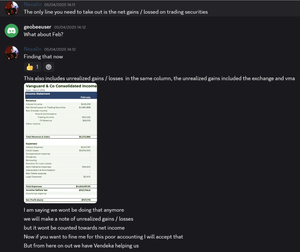
It is also worth noting that Nex was, until prompted not to in April, listing unrealised security gains as income on his statements (from VMA and the Exchange). Removing this income revealed that Vanguard was in fact haemorrhaging money, particularly cash.
Abuses of VMA and its FX system seem to be at fault, which may have been avoided with better internal risk management. For example, VMA launched with many bugs, some of which remain unpatched, without a ToS that prohibited exploits. Many exploited the system, one of the most notable being an individual who traded outside of trading hours and generated over $3 Million. Their lawyers managed to settle the case and were able to withdraw the balance for cash. Repeat for other VMA cases and inefficient FX rates and the story of how the two banks haemorrhage money becomes clear. In-game cash holdings that were $10-15 Million a few months ago show barely $2 Million at seizure.
Foreign Cash Supporting DC Deposits
Cash & Cash Equivalents

On his balance sheet, Nex separated “Cash due from Bank” as a line item, leaving cash as the main asset under “Cash and Cash Equivalents” (No gov t-bills or commercial paper present in DC markets at the time of the report). This account has incorporated foreign cash holdings held by Nexalin, despite being incapable of supporting client obligations in the event of withdrawal, nor is it recognized as an asset within Redmont.
Nexalin only held $2,210,280.80 at time of seizure, more than an order of magnitude below his claim of $32,549,263 just a few weeks prior. Nexalin listed these foreign currencies in $R ($DC) at an exchange rate of his choosing despite;
- a lack of frequent price discovery in inter-server FX
- any large conversions would likely shove the FX rate out of Vanguard’s favor.
- minecraft economies not being stable and major events could severely devalue these ‘foreign’ holdings
It appeared the rate chosen for recordkeeping was the rate Vanguard facilitates client exchanges at (which for context, valued CRP’s starting balance as R$20,000. This was a popular exchange to make).
What was a ~60% reserve ratio, is closer to 3.6% when restricted to Redmont assets, which is where the vast majority of where the banks’ deposits are ($52M of $66M, the latter incl. Nex/Vanguard accounts). To have 78.8% of your deposits in Redmont but 93% of your cash on other servers is unbelievably dangerous for depositors. There is no guarantee that this cash could be easily converted at the listed FX rate, leading to many deposit obligations being impossible to meet in the long-term. This concern is ultimately why the bank was seized, alongside non-cooperation from Nexalin in regards to the conditions of the initial tax exemption return.
Voyager & The Exchange
On the 27th of June, Voyager Bank was seized under Commerce Secretary Avaneesh2008. As above, the full DOC report can be found here.
The Exchange Failure
Uffizi Treasury Stock
Uffizi was the largest listed company on The Exchange at this point in time, with a book value of $85.5M, mostly made up of Investment Securities ($59.8M). As it turns out, Uffizi held a significant portion of its own stock, a.k.a Treasury Stock. This is treated as contra-equity, subtracting from shareholders equity. However, Uffizi’s reports listed these shares as Investment Securities, making up a large chunk of the aforementioned investment assets. This created a positive valuation loop, described below.
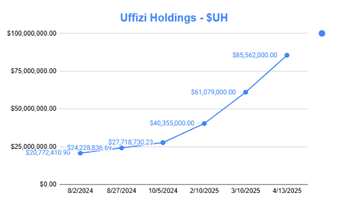
> The shares of the company falsely add to the value of the company
> The market drives the share price up.
> The value of treasury stocks inflate, increasing the value of the company
> Repeat over months for exponential growth
Uffizi’s Book value over time according to the exchange (note that time sale is not linear).
So while the company was listed at $85M in value, its real value was far below, likely in the range of 10-20 million. Since they are not a financial institution, the DOC does not audit them. However, it should be noted that the Exchange had a policy to have listed companies audited. Despite this, the valuation loop inflated the company many times over.
The Sale of Uffizi & Delistment
On the 19th of June, Stoppers announced his acquisition of a controlling stake in Uffizi through the Exchange. A few hours later, Stoppers delisted Uffizi close to its market price. Even removing the treasury stock which aren’t considered in the delistment, over $30M had to be paid out to shareholders. Uffizi was not even close to financing this - and neither did The Exchange. So where did the money for the delistment come from?
Stoppers took out a $32M loan from The Exchange to pay for the delistment. This loan came with zero collateral and zero plan to pay back the money - at this point, ToadKing now owned the Exchange after a sale financed likely by USD.
By the time of DOC intervention, the Exchange had ~41 million in deposits, ~20 million in bonds, and ~11 million in loans. This means the Exchange had over 72 million in debt to companies and individuals while having next to nothing to back it up.
Voyager
The Principal Bondholder
Voyager was the primary holder of TEX001, excluding the unsold units allocated to Stoppers himself. They hold 43,645 units of TEXT001, a bond which paid below the discount rate, for a total holding of $8.7M. This could essentially be written off, given the insolvency discussed prior. This was the major factor for seizing Voyager.
Sustainability of Operations
Voyager was already on the radar of the DOC for a number of reasons. The bank was famously been paying 5.5% interest. Of course, this is fine if they can afford it. The financial reports submitted to the DOC were monitered closely.
March
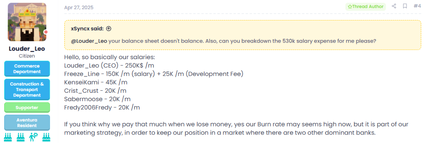
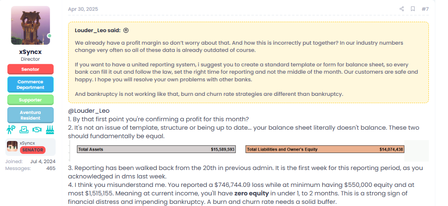
In March, they reported a $746K loss, the principal expenses were $530K on salary and $714K on interest. Being $200K in the hole for a month, then paying your people $500K seems in poor taste, but if the strategy was short-lived, or could be financed - all would be well.
It is also important to acknowledge that initially, the balance sheet didn’t balance which Sync followed up, detailing that the balance sheet was incorrectly put together. An agitated Leo seemed to interpret this as the DOC thinking that banks are static, and not that his equity was $1.5M out.
After some more back and forth, Leo then fixed the equity, claiming the missing number $1,515,155 as retained earnings. However, up until this point, Voyager had only submitted one financial report, where they declared a profit of $30,000. So either, Leo had $1.5M unaccounted for that he invented as retained earnings to balance the sheet, or there was $1.5M of non-declared profit in the first two months of operation - income that they never declared for tax purposes.
April
Voyager barely broke even in April, and with promises of income from Leo, namely through its development services, the DOC had hope for the future.
May
The May report, alongside the Exchange situation sealed Voyagers fate. Looking closer at their income statement, although it claims a $63K profit, their interest expense is not used in the calculations. They in fact, lost $817K. Leo either maliciously tried to hide it in plain sight, failed to notice glaring issues in his tax reporting, or has a gross misunderstanding of accounting.
Once again, the $530K salary expense reared its head this month. Despite losing millions, overexposing themselves to subprime low-rate bonds and failing to practice basic accounting, Voyager executives paid themselves half a million dollars a month.
The DOC evaluated these factors and came to the conclusion they stand by to this day - The Exchange and Voyager must be seized.
Immediate Aftermath
With tens of millions of dollars in these institutions, their seizures applied significant deflationary pressure on the economy, as hundreds of players could not access the bulk of their money. Property was particularly affected as these are primarily sold at auction by the DCT.
The DOC experienced backlash for its handling of the situation, particularly in the returning insured & recovered balances which has sat frozen for over two months - stifling players enjoyment and capacity to conduct business.
State-Owned Withdrawal Facility
Summary
The government wishes to return more than the $50,000 insurance per person, but the government treasury is too small to facilitate this all at once. The True Economic Redemption Act is currently in the House of Representatives and proposes a State-Owned Withdrawal Facility ("SOWF") which will be jointly run by the DOC and FRB. The facility's goal is to "facilitate the withdrawal and payment of deposits owned by banks that are unable to pay them back."
Structure
Deposits from Vanguard, Discover, Voyager, and The Exchange may be transferred by the DOC to the SOWF, alongside any assets that can be liquidated from the failed banks. The FRB has the power to mint funds if required, and the DOC will disburse funds to depositors as appropriate. Deposits not covered by insurance, liquidation, minting or additional congressional funding will be considered unrecoverable and cannot be pursued by depositors.
SOWF Notes
The SOWF has the power to create "SOWF Notes" to trade funds stored in the facility prior to withdrawal. A SOWF Note, upon its specified maturity, will be redeemable for in-game cash. SOWF Notes are not considered legal tender, but they are be backed by the Commonwealth government and accepted as payment by government institutions. Private companies are not required to accept SOWF Notes as payment, but are encouraged to do so.
